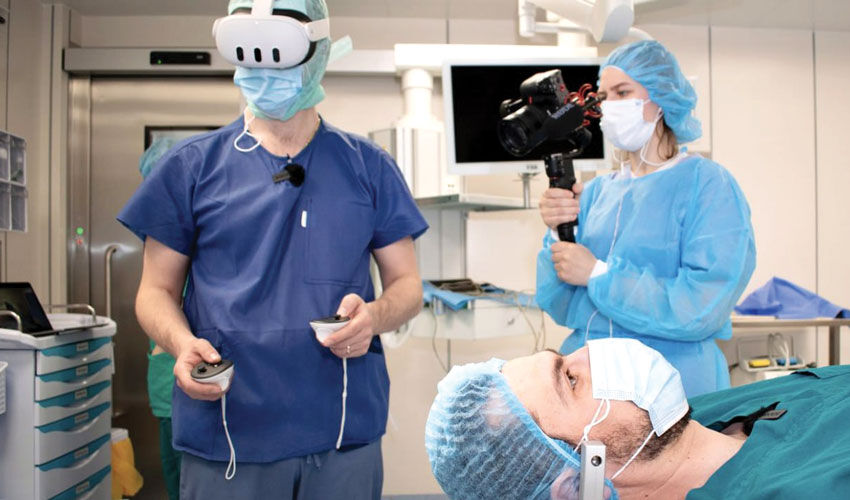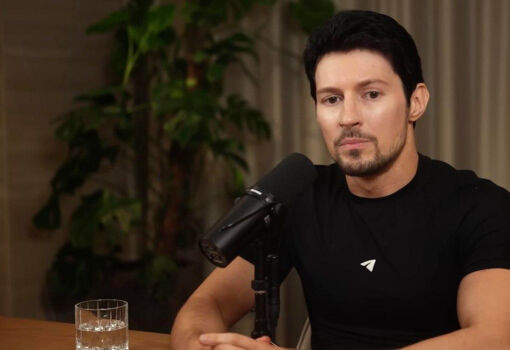
Argus AI is led by neurosurgeon Alexandru Andruska and artificial intelligence specialist Vladimir Verbulsky. Together with the team, they have created a product that is designed to change the usual way of treating brain tumors.
Typically, neurosurgery uses neuronavigation, an expensive device costing up to 500,000 euros. Argus AI licenses cost from €50,000 and could be an option for medical centers with small budgets.
In one of the earliest clinical cases, the Argus AI team used a 3D model of the brain in VR to help plan the removal of a tumor in a woman’s frontal lobe, identifying angles of approach and key vessels to avoid.
For a prototype, this was a rare opportunity: real feedback from a real case. Now, after two applications during surgery, the product is approaching European certification for medical devices, which ensures it meets EU standards for health, safety and performance.
All procedures so far have been performed with full ethical approval and patient consent. “We are testing the hypothesis that surgery can be done faster and safer with the VR headset,” Vladimir Verbulsky told Emerging Europe portal. The headset is mainly used during the planning phase, although it can assist throughout the surgery.
Using scans from MRI and CT scanners, the team creates immersive virtual reality environments that allow surgeons to explore and rehearse complex procedures before they even enter the operating room. “One wrong move can destroy brain tissue that doesn’t regenerate,” says Alexandru Andruska, adding that the use of VR makes surgery more precise.
The team is also discussing similar clinical trials with hospitals in Germany, Turkey and the UAE.
Alexandru, who himself studied programming before entering medical school, says the real value of Argus AI lies in its bridging of two worlds: clinical knowledge and technical precision.
Argus AI’s progress has not gone unnoticed. The team has won the Techstars Startup Weekend AI Edition, Startup Grind Pitch Battle, and LevelUP Startup Accelerator. They also received a full scholarship to Summer 2025 Edition at Draper University in Silicon Valley. The company is a resident of Moldova IT-Park.
Argus AI offers hope for what could be in store for Moldova’s medical technology sector. Its early-stage success is due to the rare combination of regulatory flexibility, medical accessibility and close collaboration between surgeons and engineers that exists in Moldova.
In most European countries, bringing medical innovations to market can be a lengthy process involving a lot of paperwork. As We4Health’s Mihai Daskal explains, Moldova allows “well-documented trials” conducted in clinical settings that help early-stage ideas, such as Argus AI, move beyond the lab.
Argus AI’s progress is bolstered by the support of Moldova’s other players. We4Health is a Moldovan initiative launched in early 2025 to bring together healthcare opinion leaders, innovators and experts to accelerate innovation in medicine. It brings together professionals from the private sector, academia and government to bridge the gap between clinical practice and innovation.
The initiative, led by professor and innovator Mihai Daskel, bridges the gap between the private, academic and public health sectors. Daskel also leads Baby Medy, a startup optimizing pediatric care with digital tools.
According to Mihai Daskel, Moldova’s startup ecosystem is uniquely positioned to bring together research, regulation and practice. “We want to become a regional center for medical technology.” To achieve this, Moldova needs investors. Even if clinical trials are cheaper than in the rest of Europe, they are still expensive.
The Moldova Innovation Technology Park (MITP) has become a key platform for healthcare startups. Offering a flat tax rate of 7% and simplified administrative procedures, MITP helps early-stage health technology teams scale faster, form partnerships and access funding. Through initiatives such as technology clusters and international partnerships, MITP connects Moldovan innovators to global markets.
There are still gaps to fill, but Moldova has a rare combination of ingredients: motivated founders, educated medical professionals, an open government, and growing international cooperation. As Mihai Daskal says, “In technology, you can just build. In medicine, you need validation and clinical logic.”
Moldova seems to be able to offer both.

